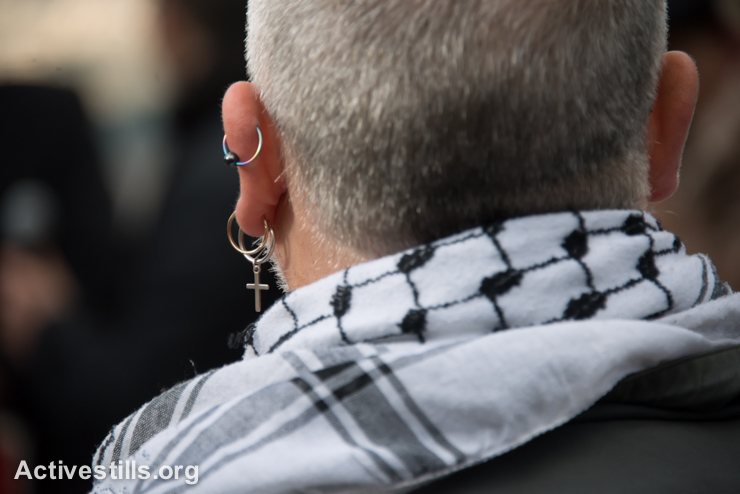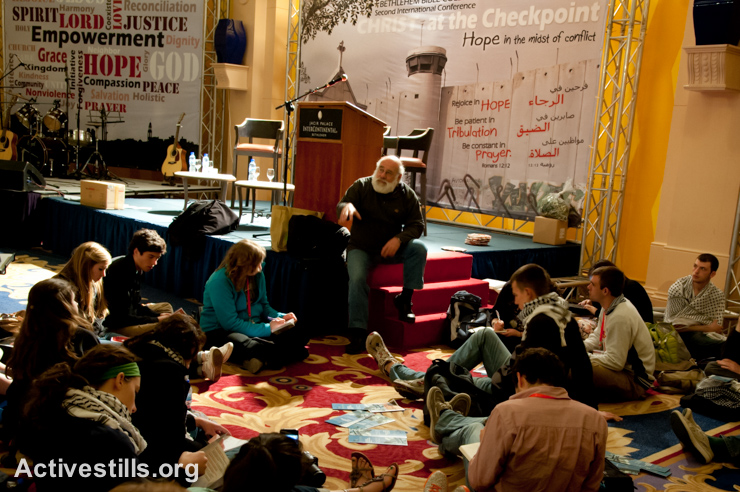America’s largest Christian Zionist organization boasts about its numbers. But while their influence is a given, many Christians are slowly but surely seeing the justice of the Palestinian cause.
Text and photos by: Ryan Rodrick Beiler/Activestills.org

Christians United for Israel (CUFI), the largest Zionist Christian organization in the U.S., recently sent an email blast celebrating the milestone of “2 million members.” The Washington Post’s right-wing blogger Jennifer Rubin dutifully reported on the CUFI press release, which included an additional list of impressive numbers:
According to CUFI, it has “driven hundreds of thousands of emails to government officials, held 2,162 pro-Israel events in cities and towns across the country, garnered more than 1.2 million Facebook fans, brought 304 leading pastors to Israel on 12 Pastors Leadership Tours, has trained more 2,500 students on how best to stand with Israel, presently has recognized college chapters on 140 campuses as well as an active presence at an additional 163 universities.”
However, as reported by conservative Christian magazine Charisma, “insiders know such membership consists of nothing but CUFI having your email address. There’s nothing to pay, nothing to sign. And even if you drop out, you’re still counted as a member. Given this, insiders say the number of actual donors is closer to 30,000 to 50,000.”
So I guess CUFI counts me as a “member,” since I get their emails in order to keep tabs on their antics. (I always want to change the wording on their action alerts to Congress, but they don’t allow you to edit their talking points. Typical.) So at best they can only boast 1,999,999 actual supporters. I also happen to know that +972’s own Ami Kaufman has even “liked” CUFI on Facebook, and I’m pretty sure he doesn’t really like them like them.
But the numbers game does not diminish CUFI’s significant impact. They certainly have far more influence than any Palestinian solidarity organization. (Fun fact, though: Jewish Voice for Peace is kicking AIPAC’s ass on Facebook, 199,412 to 93,902. Help JVP get over 200,000—but only if you really like them like them!)
“The pro-Israel side is still far ahead in the battle for the hearts and minds of America’s evangelicals,” CUFI’s executive director, David Brog, accurately claimed in an article last year, “Anti-Israel Christians do not come close to matching CUFI’s size, activity, or influence.”
Brog’s article both asserted the strength of the Zionist Christian movement while trying to scare up additional support to counter the growing movement of Christians expressing solidarity with Palestine. But if you ignore his tone, framing, assumptions, exaggerations and accusations, his article is actually quite encouraging:
While small in number, these activists seem to have extensive funds. They are taking far more Christian leaders and influencers to Israel and the Palestinian Authority than the pro-Israel side. Through these newly-minted allies, they are reaching an ever expanding network of evangelicals in the United States.

Brog ends the article by saying, “Israel’s enemies are telling very big lies to some very influential Christians—and telling them quite well.” But he and his allies are taking their own liberties with the truth by distorting their actual beliefs of most Palestine-sympathetic Christians. The truth is that while this movement is real and growing, even at its most progressive edges, church-based solidarity with Palestinians is painstakingly balanced in its institutional statements, and anything but “anti-Israel.”
Case in point: Rubin claims in her blog entry that “Many of these churches have joined BDS and become otherwise knee-jerk critics of Israel.” Even the Presbyterian Church USA (PCUSA), which passed a divestment resolution against Hewlett-Packard, Caterpillar and Motorola for profiting from the Israeli occupation, was careful to affirm Israel and distance itself from BDS (Boycott, Divestment and Sanctions). As The New York Times reported:
The measure that was passed not only called for divestment but also reaffirmed Israel’s right to exist, endorsed a two-state solution, encouraged interfaith dialogue and travel to the Holy Land, and instructed the church to undertake “positive investment” in endeavors that advance peace and improve the lives of Israelis and Palestinians. It also said the motion was “not to be construed” as “alignment with or endorsement of the global B.D.S.”

It would be great if U.S. Christians could more boldly answer the call of the Palestinian churches as presented in the Kairos Palestine document, which clearly calls for full BDS with the goal of: “justice and freedom for the Palestinians, and peace and security for the Israel as well.”
Such statements defy Brog’s caricature of Palestinian Christians as “telling a one-sided narrative of Jewish persecution of Christians that may sow the seeds of future hate.”
Add CUFI’s deceptive rhetoric, bloated membership rolls and distortions of their opponents’ views to the list of contradictions between the teachings of the Jesus they claim to follow and their actions in “defense” of Israel.

Rubin’s post contains an even more astounding internal contradiction. She reports that CUFI’s members “take scripture literally”—as many would likely claim. But later comes this astounding passage:
Brog says, “We have a responsibility to ensure the next generation of Christians support Israel.” As with all groups, younger Christians evince less support for Israel than their parents’ generation. Brog perceives that younger Christians need to be convinced that Israel is on the side of “justice and the oppressed,” and that requires work to tell the facts and combat Palestinian propaganda. “They have read their Bible. They say, ‘Now convince me your side is just.’”
The case needs to be made, he argues, that if one is for gay rights, equality for women, the rule of law, democracy, human rights, etc., Israel is on the right side.
So now even conservative right-wing Christian organizations are promoting LGBTQ rights and feminism! And it only took Israel to help them see the light! (Just don’t mention the gender-segregated buses.)
Brog may be onto something by dangling these laudable values at younger Christians. But it’s laughable that even a razor-thin margin of CUFI’s current members would support them. While older generations continue to resist equal rights for all God’s children, younger members of even the most conservative wings of U.S. Christianity are intuitively more open to more progressive perspectives. The bad news for CUFI is that this youthful progressivism includes solidarity with Palestinians and respect for their equal rights—instead of literalist interpretations of the Bible that privilege tribal identities.

CUFI is big because signing up Zionist Christians is like shooting fish in a barrel, or picking low-hanging fruit, or any other metaphor about doing something that’s easy. Brog essentially admits as much, telling Rubin: “[W]hen CUFI started in 2006 its first task was to tap into what was already there. ‘Number one was taking present day deep support for Israel in the Christian community and organizing it.’”
That’s not a movement. That’s exploiting inertia. America’s churches are permeated with an unthinking default Zionism stemming in part from a righteous awareness—or a guilty conscience—regarding Holocaust history on one hand, and on the other, beguilement with Israel’s starring role in popular End Times mythologies from The Late Great Planet Earth to Left Behind. Add a dash of Islamophobic rhetoric and you’ve got a big mailing list.

If anything, CUFI represents the last desperate gasps of an outmoded worldview.
Its founder is Pastor John Hagee, whose endorsement then-presdential candidate John McCain rejected in 2008 over controversial remarks about God, Hitler and Jews. Their recent spokespersons include Glenn Beck, who led a flop of a rally in Jerusalem after he became too extreme even for Fox News. Their list of conference speakers reads like a who’s-who of the neo-con chickenhawks who pushed the U.S. to invade Iraq and now have their bombsights set on Iran. These figures have a following, sure, but they are far from mainstream and are becoming more marginal by the minute.
Presented with the reality on the ground, rather than with scaremongering nonsense that “Israel is our first line of defense against Islamic terror,” U.S. Christians are slowly but surely seeing the justice of the Palestinian cause. One can only hope that their journey to the right side of history will happen while there’s still time for them to support a just peace—instead of being counted among its obstacles.
Related:
Zionist Christians’ war on the true meaning of Christmas
An open letter to Evangelical supporters of Israel
PHOTOS: ‘Christ at the Checkpoint’ challenges Christian Zionism


